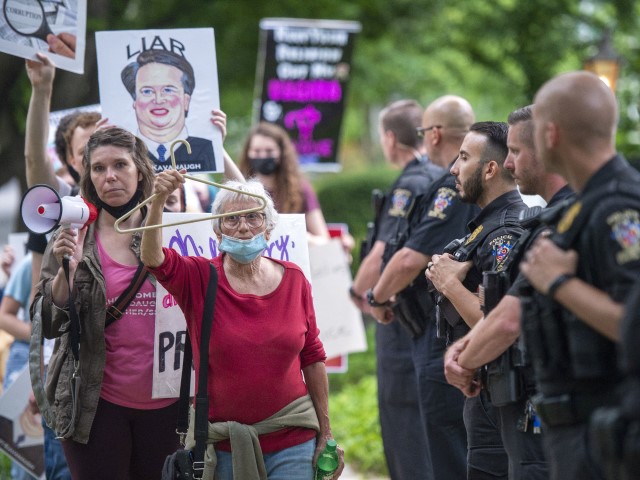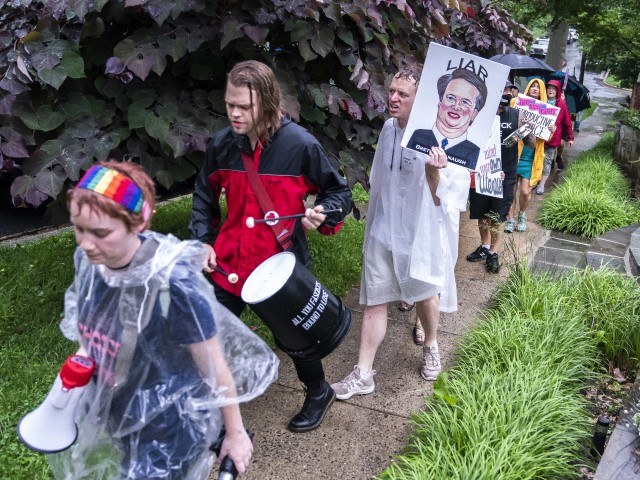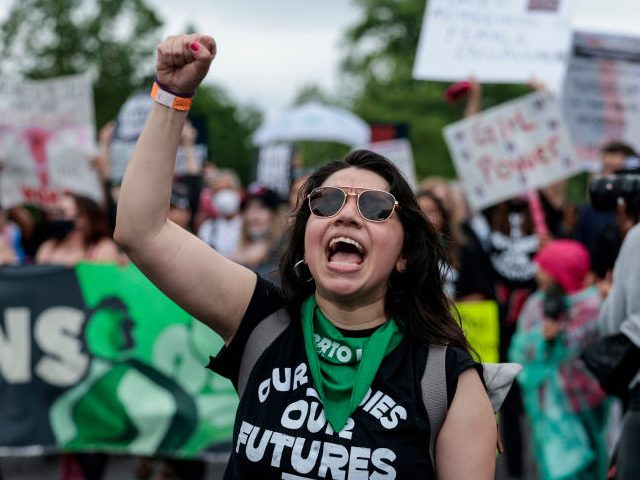U.S. Marshals assigned to guard Supreme Court justices during the controversy over Roe v. Wade last year were reportedly told not to arrest protesters that gathered outside their private homes.
Last year, individual Supreme Court Justices were targeted by protesters after an illegal leak of a draft decision aiming to overturn Roe v. Wade before it had been officially decided. At the time, even the left-wing Washington Post admitted such protests were likely illegal according to Title 18, Section 1507, of the U.S. Code.
“While protest is indeed ingrained in American democracy, legally speaking, the comparison between protesting a politician at home and a member of the judiciary at home is inexact. And experts say the latter category of protests is probably illegal regardless of how peaceful the demonstrations are,” the Post admitted.
“The law states that it is illegal, ‘with the intent of influencing any judge to: ‘picket or parade “’n or near a building or residence occupied or used by such judge, juror, witness, or court officer,'” it added, “‘or with such intent,’ to resort’“to any other demonstration in or near any such building or residence.'”

Police officers look on as abortion advocates hold a demonstration outside the home of U.S. Supreme Court Justice Brett Kavanaugh on May 18, 2022 in Chevy Chase, Maryland. Protests have been organized intermittently outside the homes of justices who signed onto a draft opinion that would overturn the landmark Roe v Wade decision. (Bonnie Cash/Getty)
According to documents obtained by Alabama Republican Sen. Katie Britt, Attorney General Merrick Garland ordered U.S. Marshals not to arrest protesters, telling them it should “not” be a priority. Per the Washington Times:
Mr. Garland told senators earlier this month that his prosecutors couldn’t bring cases unless the marshals made arrests, and the marshals on the scene didn’t think there was a reason to do that.
Ms. Britt said the guidance documents show they were directed not to.
“They were actively discouraged from doing so,” she said.
A section of the guidance given to marshalls even said that arrests were “not the goal” of their deployment, with another section advising that arrests should be “a last resort to prevent physical harm.”
Regarding the law barring Americans from pressuring judges to influence a court decision, the attorney general told agents in the guidelines that the law could face legal challenges and discouraged them from using that as a base to make an arrest. Sen. Britt also said that the guidance told agents to coordinate with federal prosecutors before making an arrest, which also contradicts Garland’s claim that the agents were free.
“Any contemplated [marshals] enforcement action should be coordinated in advance with the appropriate USAO,” the guidance said.
At the height of the protests, police arrested California resident Nicholas John Roske, 26, near Justice Brett Kavanaugh’s house in Maryland after he had allegedly traveled there to murder the sitting judge to protect Roe v. Wade.

Protesters march past Supreme Court Justice Brett Kavanaugh’s home on June 8, 2022, in Chevy Chase, Maryland. An armed man was arrested near Kavanaugh’s home as the court prepares to announce decisions for about 30 cases. (Nathan Howard/Getty)
“A California man carrying at least one weapon near Brett M. Kavanaugh’s Maryland home has been taken into custody by police after telling officers he wanted to kill the Supreme Court justice,” reported the Washington Post at the time.
“Two people familiar with the investigation said the initial evidence indicates the man was angry about the leaked draft of an opinion by the Supreme Court signaling that the court is preparing to overturn Roe. v. Wade,” continued the Post.
Police and court documents say that Roske had in his possession a Glock-17 pistol, a tactical knife, pepper spray, zip ties, and a crowbar.

COMMENTS
Please let us know if you're having issues with commenting.